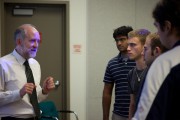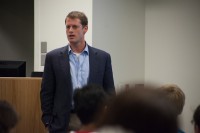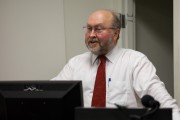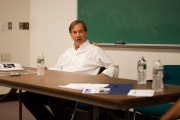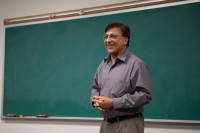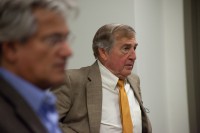- About this Program
- 2012 Conflict in the 21st Century
- 2011 Our Nuclear Age: Peril and Promise
- Syllabus
- Lecturers and Advisers
- Lecturers and Advisors
- Texts
- Colloquium Members
- Research
- The MX Missile Awareness Project
- EPIIC Weekend Immersion
- Inquiry
- Special Opportunities
- 2010 South Asia: Conflict, Culture Complexity, and Change
- 2009 Cities: Forging an Urban Future
- 2008 Global Poverty and Inequality
- 2007 Global Crises: Governance and Intervention
- 2006 The Politics of Fear
- 2005 Oil and Water
- 2004 Dilemmas of Empire and Nation Building
- 2003 Sovereignty and Intervention
- 2002 Global Inequities
- 2001 Race and Ethniciity: A Global Inquiry
- 2000 Global Games: Sports, Politics, and Society
- Symposium
- 1999 Global Crime, Corruption, and Accountability
- 1998 Exodus and Exile: Refugees, Migration, and Global Security
- 1997 The Future of Democracy
- 1996 Religion, Politics, and Society
- 1995 20/20 Visions of the Future
- 1994 Ethnicity, Religion and Nationalism
- 1993 Transformations in the Global Economy
- 1992 - International Security: The Environmental Dimension
- 1991 Confronting Political and Social Evil
- 1990 The Militarization of the Third World
- 1989 Drugs, International Security and U.S. Public Policy
- 1988 Foreign Policy Imperatives for the Next Presidency
- 1988 Covert Action and Democracy
- 1987 The West Bank and Gaza Strip
- 1986 International Terrorism
- News
- Press Clips
- Calendar
- Resources
EPIIC Archives
Syllabus
EPIIC 2010-11
Our Nuclear Age: Peril and Promise
EXP 91F
SYLLABUS
[this will be a running document]
Orientation to EPIIC 2010-11
__________________________________________________________________
Thursday, September 9
No Class – Rosh Hashanah
__________________________________________________________________
Tuesday, September 14
Introduction to Our Nuclear Age
Guest Lecturer: Jim Walsh
Dr. Jim Walsh is an expert in international security and a Research Associate at the Massachusetts Institute of Technology’s Security Studies Program (SSP). Before coming to MIT, Dr. Walsh was Executive Director of the Managing the Atom project at Harvard University’s John F. Kennedy School of Government and a visiting scholar at the Center for Global Security Research at Lawrence Livermore National Laboratory. He has taught at both Harvard University and MIT. Dr. Walsh received his Ph.D from the Massachusetts Institute of Technology. Dr. Walsh has testified before the United States Senate on the issue of nuclear terrorism and on Iran’s nuclear program. He is one of a handful of Americans who has traveled to both Iran and North Korea for talks with officials about nuclear issues.
Readings
Handouts
• Phillip Morrison Biographical Memoir
• "Learning from Past Success: The NPT and the Future of Nonproliferation" | Jim Walsh
• DPRK Trip Report | Jim Walsh
• "Iran and the Nuclear Issue" | Jim Walsh
__________________________________________________________________
Thursday, September 16
The Science and Mechanics of Our Nuclear Age
Guest Lecturer: Matthew Bunn
Matthew Bunn is an Associate Professor at Harvard University's John F. Kennedy School of Government as well as Co-Principal Investigator for the Project on Managing the Atom and Co-Principal Investigator for the Energy Research, Development, Demonstration, and Deployment (ERD3) Policy Project at the Belfer Center for Science and International Affairs. Before joining the Kennedy School in January 1997, he served for three years as an adviser to the Office of Science and Technology Policy, where he played a major role in U.S. policies related to the control and disposition of weapons-usable nuclear materials in the United States and the former Soviet Union, and directed a secret study for President Clinton on security for nuclear materials in Russia. Previously, Bunn was at the National Academy of Sciences, where he directed the two-volume study Management and Disposition of Excess Weapons Plutonium.
Readings
Handouts
• International Panel on Fissile Materials, “Appendix: Fissile Materials and Nuclear Weapons,” in Global Fissile Materials Report 2008: Scope and Verification of a Fissile Material (Cutoff) Treaty (Princeton, N.J.: IPFM, 2008), http://www.ipfmlibrary.org/gfmr08.pdf, pp. 102-109.
• Office of Technology Assessment, “Technical Aspects of Nuclear Proliferation,” in Technologies Underlying Weapons of Mass Destruction (Washington, DC: OTA, December 1993), pp. 119-134, 149-158. http://www.fas.org/spp/starwars/ota/9344.html
• Office of Technology Assessment, The Effects of Nuclear War (Washington, DC: OTA, May 1979), http://www.princeton.edu/~ota/disk3/1979/7906/7906.PDF, pp. 15-46
• “Climate Effects of a Regional Nuclear Conflict” | Alan Robock | IPRC Climate, Vol. 7, No. 1, 2007, pp. 16-18. http://climate.envsci.rutgers.edu/pdf/iprc_climate_NW.pdf (other presentations of these results available at http://climate.envsci.rutgers.edu/nuclear/).
• “Nuclear Weapons Effects” [lecture slides], Alexander Glaser, http://www.princeton.edu/~aglaser/lecture2007_weaponeffects.pdf
• “Dedicated Facilities,” in U.S. Congress, Office of Technology Assessment, Nuclear
• Proliferation and Safeguards (Washington, DC: Government Printing Office, 1977), pp. 174-181. http://govinfo.library.unt.edu/ota/Ota_5/DATA/1977/7705.PDF
• “The Gas Centrifuge and Nuclear Weapons Proliferation,” | Houston G. Wood, Alexander Glaser, and R. Scott Kemp | Physics Today, pp. 40-45 http://ptonline.aip.org/journals/doc/PHTOAD- ft/vol_61/iss_9/40_1.shtml
• Physics for Future Presidents: The Science Behind the Headlines | Richard A. Muller | Chapters 1, 2, 3, 10, 11 and Part I Summary
__________________________________________________________________
Tuesday, September 21
Deterrence and Decisionmaking
Guest Lecturer: Daryl Press
Daryl G. Press is Associate Professor in the Department of Government, Dartmouth College. Professor Press is the author of Calculating Credibility: How Leaders Assess Military Threats a book on decision-making during crises. Professor Press has worked as a consultant for the RAND Corporation and the U.S. Department of Defense, and is a research affiliate at the Security Studies Program at MIT. He also serves as an Associate Editor at the journal International Security. Professor Press is currently writing a book (with Keir Lieber, Georgetown University) on nuclear deterrence - during the Cold War and the future - as well as a series of articles (with Eugene Gholz, UT Austin) on energy and security.
Readings
Book
• The First War of Physics: The Secret History of the Atomic Bomb, 1939-1949 | Jim Baggott
Handouts
• Calculating Credibility: How Leaders Assess Military Threats | Daryl G. Press | Chapters 1 and 4
• “Energy Alarmism: The Myths that Make Americans Worry about Oil | Eugene Gholz and Daryl G. Press
• “The Nukes We Need: Preserving the American Deterrent” | Keir A. Lieber and Daryl G. Press
__________________________________________________________________
Thursday, September 23
Deterrence Theory
Lecturer: Rizwan Lahda (EPIIC Teaching Assistant)
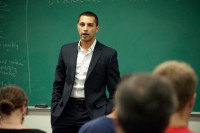
Readings
Handouts
• "To What Ends Military Power?" | Robert Art | International Security, Vol. 4, No. 4 (Spring 1980), pp. 3-35
• "War Department Thinking on the Atomic Bomb" | Bernard Brodie | The Bulletin of the Atomic Scientists, No. 3 (June 1947), pp. 150-155
• "The Delicate Balance of Terror" | Albert Wohlstetter | Foreign Affairs, No. 37 (1959), pp. 211-234
• "A Probability Model of Credibility: Analyzing Strategic Nuclear Deterrence Systems" | Claudio Cioffi-Revilla | The Journal of Conflict Resolution, Vol. 27, No. 1 (March 1983), pp. 73-108
__________________________________________________________________
Friday, September 24-26
Weekend Immersion
Guest Lecturer: Pervez Hoodbhoy
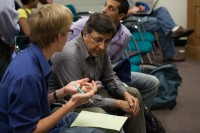
Pervez Hoodbhoy is professor of nuclear and high energy physics, as well as chairman, at the department of physics, Quaid-e-Azam University, Islamabad, Pakistan. He remains an active physicist who often lectures at US and European research laboratories and universities. Dr. Hoodbhoy received the Baker Award for Electronics and the Abdus Salam Prize for Mathematics. Over a period of 25 years, Dr. Hoodbhoy created and anchored a series of television programs that dissected the problems of Pakistan’s education system, and two other series that aimed at bringing scientific concepts to ordinary members of the public. He is the author of Islam and Science: Religious Orthodoxy and the Battle for Rationality, now in seven languages. Also in 2003, Dr. Hoodbhoy was invited to the Pugwash Council. He is a sponsor of The Bulletin of the Atomic Scientists, and a member of the Permanent Monitoring Panel on Terrorism of the World Federation of Scientists. Dr. Hoodbhoy is a recipient of the Dr. Jean Mayer Global Citizenship Award from the Institute and will be an INSPIRE Fellow during the fall.
Reading (to be done by the trip)
Book
• Inside Nuclear South Asia | Scott Sagan, ed.
Handouts
• “Nuclear Ring Reportedly Had Advanced Design” | David E. Sanger
• “Building a Strategic US-Pakistan Nuclear Relationship” | Rolf Mowatt-Larssen | pp. 1-3
• “Posturing for Peace? Pakistan’s Nuclear Postures and South Asian Stability” | Vipin Narang
• “Pakistan’s Nuclear Posture: Implications for South Asian Stability | Vipin Narang
• “Pakistan National Statement” | from the Nuclear Security Summit, April 2010
• “Pakistan’s Nuclear Chronology” | Allison Smith
• “Nuclear Notebook: Pakistani Nuclear Forces, 2009” | Robert S. Norris and Hans Kristensen | Bulletin of the Atomic Scientists
• “The Flight to Nowhere: Pakistan’s Nuclear Trajectory” | Pervez Hoodbhoy
• “Pakistan’s Nuclear Future: Reigning in the Risk” | Henry Sokolski ed. | Chapters 1, 2, 3
• “The Anarchic Republic” | Ahmed Rashid | The National Interest
• “The Stand-Off: How Jihadi Groups Helped Provoke the 21st Century’s First Nuclear Crisis” | Steve Coll | The New Yorker
Recommended
• “India and the Nuclear Suppliers Group” | Elspeth Thompson, Dickson Yeo
• “Nuclear Dangers in South Asia” | Scott Sagan
• “Last Chance for Pakistan” | Ahmed Rashid
• “Bringing India’s Dream to Fruition” | T.P Sreenivasan
• “The Fakirs: India, Pakistan, and North Korea” In The Nuclear Express | Thomas Reed and Danny Stillman
__________________________________________________________________
Tuesday, September 28
The Global Nuclear Future
Guest Lecturer: Steve Miller
Steven E. Miller is Director of the International Security Program, Editor-in-Chief of the quarterly journal, International Security and also co-editor of the International Security Program's book series, Belfer Center Studies in International Security – all at the Belfer Center for Science and International Affairs at Harvard’s Kennedy School. Previously, he was Senior Research Fellow at the Stockholm International Peace Research Institute (SIPRI) and taught Defense and Arms Control Studies in the Department of Political Science at the Massachusetts Institute of Technology. He is co-author of the monograph, War with Iraq: Costs, Consequences, and Alternatives (2002) and a frequent contributor to Nezavisimaya Gazeta. Miller is editor or co-editor of some two dozen books, including, most recently, Offense, Defense, and War (October 2004), The Russian Military: Power and Policy (September 2004), Nationalism and Ethnic Conflict — Revised Edition (2001), and The Rise of China (2000).
Miller is a Fellow of the American Academy of Arts and Sciences, where he has been a member of their Committee on International Security Studies (CISS). He is also co-chair of the U.S. Pugwash Committee, a member of the Council of International Pugwash, a member of the Advisory Committee of the Stockholm International Peace Research Institute (SIPRI), a member of the Scientific Committee of the Landau Network Centro Volta (Italy), and formerly a member of the Council of the International Institute for Strategic Studies (IISS).
Readings
Books
• Daedalus, Volume 1, On the Global Nuclear Future, Fall 2009, pp 7-18 (“Nuclear Power without Nuclear Proliferation?”)
• Daedalus, Volume 2, On the Global Nuclear Future, Winter 2010, pp 126-137 ("Alternative Nuclear Futures")
_________________________________________________________________
Thursday, September 30
Getting to Zero
Guest Lecturer: Bruce G. Blair
Bruce G. Blair is the president of the World Security Institute, a nonprofit organization that he founded in 2000 to promote independent research and journalism on global affairs. In addition, he is the executive producer for Azimuth Media and Foreign Exchange with Daljit Dhaliwal, and publisher of Washington ProFile (Russian), Washington Observer (Chinese), Washington Prism (Farsi), Taqrir Washington (Arabic) and China Security. WSI is also the host organization for the Pulitzer Center on Crisis Reporting. Dr. Blair is Co-founder and Co-coordinator of Global Zero, an international non-partisan group of 200 world leaders dedicated to achieving the elimination of nuclear weapons. He is an expert on U.S. and Russian security policies, specializing in nuclear forces and command-control systems. He has frequently testified before Congress and has taught security studies as a visiting professor at Yale and Princeton universities. In 1999, he was awarded a MacArthur Fellowship Prize for his research, work and leadership on de-alerting nuclear forces. In 2008, he was selected as a finalist for a Skoll Social Entrepreneur Award. Dr. Blair was a senior fellow in the Foreign Policy Studies Program at the Brookings Institution from 1987 to 2000. In previous positions, he served as a project director at the Congressional Office of Technology Assessment from 1982 to 1985. From 1970 to 1974, Dr. Blair served in the U.S. Air Force, serving as a Minuteman ICBM launch control officer and support officer for the Strategic Air Command’s Airborne Command Post.
Readings
Books
• Daedalus, Volume 1, On the Global Nuclear Future, Fall 2009, pp 124-129 (“A World without Nuclear Weapons?”), pp 140-152 (“Toward a Nuclear-Weapons Free World”), pp 153-156 (Taking Steps toward a World Free of Nuclear Weapons”), pp 157-168 (“Shared Responsibilities for Nuclear Disarmament”)
Handouts
• "Nuclear weapons: Is full disarmament possible?", Robert Marquand, Christian Science Monitor, April 6, 2010
• “Is Exploring Abolition a Distraction or a Necessity?”, George Perkovich and James M. Acton
• “Ban the Bomb. Really.”, Michael Krepon, The American Interest
• “Off Target”, Kurt Pitzer, Mother Jones
• “Remarks by the President at the Acceptance of the Nobel Peace Prize”, President Barack Obama
• "Preventing Armageddon: Drell Lecture examines the road to nuclear arms elimination", Stanford Report
• "A World Free of Nuclear Weapons", U.S. Department of State, Bureau of International Information Programs
• “The Illogic of Zero”, Bruce Tertrais, The Washington Quarterly, April 2010
Evening Event
(Screening of Countdown to Zero in Pearson 104 at 7:30pm – mandatory)
__________________________________________________________________
Tuesday, October 5
The Complexities of Negotiations with North Korea
(Dr. Mayer Global Citizenship Award Lecture)
Guest Lecturer: Amb. Stephen Bosworth
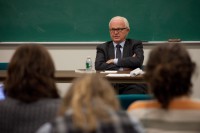
Dean of The Fletcher School of Law and Diplomacy at Tufts University since 2001, and also U.S. Special Representative for North Korea Policy. He served as U.S. Ambassador to the Republic of Korea from November 1997 - February 2001. From 1995-1997, Executive Director of the Korean Peninsula Energy Development Organization (KEDO), an international consortium formed to oversee implementation of the U.S./North Korean Agreed Framework on Nuclear Matters. From 1988 to 1996, President and Chief Executive Officer of the United States-Japan Foundation, a private foundation with programs in education, public and private leadership exchanges, and policy studies. Prior to this appointment, he was an officer in the Department of State for 25 years, serving in a number of capacities including two appointments as U.S. Ambassador. From 1979 to 1981 he served as Ambassador to Tunisia, and from 1984 to 1987, he served as Ambassador to the Philippines during the transition from the regime of Ferdinand Marcos to that of Corazon Aquino. He has also held senior positions in the State Department including Director of Policy Planning, Principal Deputy Assistant Secretary of State for Inter-American Affairs, and Deputy Assistant Secretary for Economic Affairs. He has been an adjunct professor at Columbia University’s School of International and Public Affairs and a non-resident senior associate at the Carnegie Endowment of International Peace. Honors include Order of the Rising Sun, Gold and Silver Star – Government of Japan (2005); Diplomat of the Year Award, given by the Academy for Diplomacy (1987); Distinguished Honor Award from the Department of State (1976 and l986); and Arthur S. Fleming Award as one of the Ten Outstanding Young Officials in Federal Government (1976).
Readings
Book
• Chasing the Sun: Rethinking East Asian Policy, Morton Abramowitz and Stephen Bosworth
• Daedalus, Volume 2, On the Global Nuclear Future, Winter 2010, pp 44-56 ("Lessons Learned from the North Korea Crisis")
Handouts
• Nuclear North Korea: A Debate on Engagement Strategies, Victor D. Cha and David C. Kang, pp 13-69, 161-185
• “North Korea Inside Out: The Case for Economic Engagement”, Report of an Independent Task Force convened by the Asia Society, Center on US-China Relations, and the University of California’ Institute on Global Conflict and Cooperation, December 2009
• “Former President Carter Travels to North Korea”, Global Security Newswire, August 25, 2010
• “US Misses History Lessons on Korea”, Sung-Yoon Lee, July 2, 2010
• “North Korea Mystery Deepens”, Fareed Zakaria, CNN Opinion, May 27, 2010
• “North Korea under Tightening Sanctions”, Overview, International Crisis Group, March 15, 2010
• “North Korea’s Missile Test and the Road Ahead: A Response to James J. Przystup”, Ey Soo Kim, PacNet, April 28, 2009
Evening Event
(Dr. Jean Mayer Award Lecture and Presentation on “Dealing with North Korea: A Current Snapshot” at 8:00pm in Cabot Auditorium)
__________________________________________________________________
Thursday, October 7
First Exam
Note Special Time: 4:00-8:00pm, Olin 001, please bring your computer or let us know if you need a laptop to work on
__________________________________________________________________
Part I: EMP Controversy
Pervez Hoodbhoy, INSPIRE Fellow
Part II: Hiroshima
Michael Kort
Professor of Social Science and History at Boston University and a Fellow of the International History Institute. Among his many books are: The Soviet Colossus: A History of the USSR; Modernization and Revolution in China; and The Columbia Guide to Hiroshima and the Bomb and Weapons of Mass Destruction.
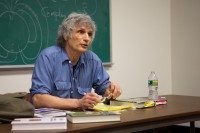
Readings
Handouts
• The Columbia Guide to Hiroshima and the Bomb, Michael Kort, pp xii-134
Online
http://www.foreignpolicy.com/articles/2010/02/17/the_boogeyman_bomb
http://www.fas.org/nuke/intro/nuke/emp.htm
http://en.wikipedia.org/wiki/Electromagnetic_pulse
140.194.76.129/publications/armytm/tm5-690/c-5.pdf
__________________________________________________________________
Nuclear Terrorism
Guest Lecturer: Graham Allison
Director of Harvard's major Center for Science and International Affairs, Graham Allison has for three decades been a leading analyst of U.S. national security and defense policy with a special interest in nuclear weapons, terrorism, and decision-making. As Assistant Secretary of Defense in the first Clinton Administration, Dr. Allison received the Defense Department's highest civilian award, the Defense Medal for Distinguished Public Service, for "reshaping relations with Russia, Ukraine, Belarus, and Kazakhstan to reduce the former Soviet nuclear arsenal." This resulted in the safe return of more than 12,000 tactical nuclear weapons from the former Soviet republics and the complete elimination of more than 4,000 strategic nuclear warheads previously targeted at the United States and left in Ukraine, Kazakhstan, and Belarus when the Soviet Union disappeared.
Dr. Allison has served as Special Advisor to the Secretary of Defense under President Reagan. He served as a member of the Defense Policy Board for Secretaries Weinberger, Carlucci, Cheney, Aspin, Perry and Cohen. Dr. Allison was the organizer of the Commission on America's National Interests (1996 and 2000) that included leading Senators and national security specialists from across the country, including former Senators Sam Nunn and Bob Graham, Senators John McCain and Pat Roberts, Condoleezza Rice, Richard Armitage, and Robert Ellsworth. Dr. Allison was a founding member of the Trilateral Commission, a Director of the Council on Foreign Relations, and has been a member of public committees and commissions, among them the Baker-Cutler DOE Task Force on Nonproliferation Programs with Russia, the IAEA’s Commission of Eminent Persons, and the Commission on Prevention of Weapons of Mass Destruction Proliferation and Terrorism.
Dr. Allison’s latest book, Nuclear Terrorism: The Ultimate Preventable Catastrophe, is now in its third printing and was selected by the New York Times as one of the "100 most notable books of 2004." It presents a strategy for preventing nuclear terrorism organized under a doctrine of "Three Nos:" no loose nukes; no new nascent nukes; and no new nuclear weapons states. Dr. Allison's seminal book, Essence of Decision: Explaining the Cuban Missile Crisis, first published in 1971, and significantly revised and reissued in 1999, ranks among the bestsellers in political science with more than 400,000 copies in print.
Readings
Book
• The Annals: Nuclear Terrorism, Graham Allison, special editor
• Daedalus, Volume 1, On the Global Nuclear Future, Fall 2009, pp 112-23 ("Reducing the Greatest Risks of Nuclear Theft and Terrorism")
Handout
• “The Ongoing Failure of Imagination,” Graham Allison, Bulletin of Atomic Scientists, September/October 2006
• “Securing the Bomb 2010: Securing All Nuclear Materials in Four Years,” Matthew Bunn, Nuclear Threat Initiative, April 2010
• Exchange in The National Interest: John Mueller (“Radioactive Hype”), Graham Allison (“The Three ‘Nos’ Knows”), William Potter (“Non-Proliferation Parody”), Joe Cirincione (“Cassandra’s Conundrum”), John Mueller (“Apocalypse Later”), 2007
Online (recommended)
• http://en.wikipedia.org/wiki/Essence_of_Decision
• http://www.gwu.edu/~nsarchiv/nsa/cuba_mis_cri/
__________________________________________________________________
Tuesday, October 19
Part I: IRB Overview
Guest Lecturer: Yvonne Wakeford, IRB Coordinator, Tufts University
Part II: AQ Khan and the Nuclear Black Market
Guest Lecturer: Pervez Hoodbhoy, IGL INSPIRE Fellow
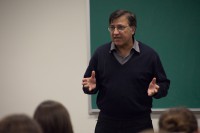
Readings
Book
• The Man from Pakistan: The True Story of the World's Most Dangerous Smuggler, Douglas Frantz and Catherine Collins
• The Nuclear Express: A Political History of the Bomb and its Proliferation, Thomas C Reed and Danny B Stillman, pp 236-277
Handouts
• “Where Is the Justice?” Bulletin of Atomic Scientists Special Report: The Khan Network, November/December 2006
__________________________________________________________________
Thursday, October 21
America’s Nuclear Posture
Guest Lecturer: Paul Hughes (Col-US Army, ret)
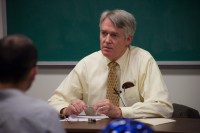
Paul Hughes is a Senior Program Officer for the Center for Conflict Analysis and Prevention of the United States Institute of Peace. He is also the executive director of the Congressional Commission on the Strategic Posture of the United States, having previously served as the director of Iraq programs in the Center for Post-Conflict Peace and Stability Operations. Prior to joining USIP, he served as an active duty Army colonel and as the Army's senior military fellow to the Institute for National Security Studies of the National Defense University. From January to August 2003, Hughes served as a senior staff officer for the Office of Reconstruction and Humanitarian Assistance and later with the Coalition Provisional Authority in Iraq. During that time he developed several policy initiatives, such as the disarmament, demobilization, and reintegration of the Iraqi military. As the director of national security policy on the Army staff from 2000-2002, he developed and provided policy guidance for the Army in numerous areas, such as arms control, weapons of mass destruction, missile defense, emerging nontraditional security issues, and crisis prediction. From 1996 to 2000, he served in the Office of the Secretary of Defense (OSD) as deputy director of the Office for Humanitarian Assistance and Anti-Personnel Landmine Policy, where he led the OSD participation in crafting U.S. landmine policy and the DOD response to Hurricane Mitch, the Turkish earthquakes, and the Mozambique floods. Hughes holds two master's of military arts and sciences and a B.A. in sociology from Colorado State University. His awards include two Defense Superior Service Medals, three Bronze Star Medals, four Meritorious Service Medals, the Joint Service Commendation Medal, four Army Commendation Medals, and several campaign and service ribbons.
Readings
Book
• America’s Strategic Posture: The Final Report of the Congressional Commission on the Strategic Posture of the United States, William J. Perry and James R. Schlesinger
Handout
• Nuclear Posture Review Report, April 2010
__________________________________________________________________
Tuesday, October 26
Guest Lecturers: Joseph Cirincione and Naila Bolus (A’87)
Joseph Cirincione joined Ploughshares Fund as president in March 2008. He is author of Bomb Scare: The History and Future of Nuclear Weapons and served previously as senior vice president for national security and international policy at the Center for American Progress and as director for nonproliferation at the Carnegie Endowment for International Peace for eight years. He worked for nine years in the U.S. House of Representatives as a professional staff member of the Committee on Armed Services and the Committee on Government Operations, and served as staff director of the bipartisan Military Reform Caucus. He teaches at the Georgetown University Graduate School of Foreign Service and is a member of the Council on Foreign Relations. His previous books include two editions of Deadly Arsenals: Nuclear, Biological and Chemical Threats, (2005 and 2002), and previous reports include Universal Compliance: A Strategy for Nuclear Security (co-author, March 2005) and WMD in Iraq (co-author, January 2004). He is the author of over 200 articles on defense issues, the producer of two DVDs on proliferation, the former publisher of the comprehensive proliferation website, Proliferation News, and is a frequent commentator in the media. Cirincione is an expert advisor to the Congressional Commission on the Strategic Posture of the United States, chaired by former Secretary of Defense William J. Perry and former Secretary of Energy and Secretary of Defense James R. Schlesinger. He also serves as a member of the Advisory Committee to the Commission on the Prevention of WMD Proliferation and Terrorism, headed by former Senator Bob Graham (D-FL) and former Senator Jim Talent (R-MO).
Executive Director of Ploughshares Fund since 1997, Naila Bolus is an authority on philanthropy and global issues, especially regarding nuclear disarmament and nonproliferation, and international security. She leads all grantmaking, fundraising, public outreach and financial management of the Ploughshares Fund. Prior to joining Ploughshares in 1997, Naila was co-director of 20/20 Vision, a national grassroots organization dedicated to revitalizing democracy by encouraging its members to communicate with decisionmakers. She helped found and served as the political director for WiLL, the Women Legislators' Lobby, where she successfully recruited one-third of all women state legislators to lobby for human services, environmental protection, and peace. She also served as the Legislative Director for Women's Action for New Directions (WAND) and lobbied Congress on a range of security and women's issues.
Readings
Book
• Bomb Scare: The History and Future of Nuclear Weapons, Joseph Cirincione
Thursday, October 28
The NPT
Lecturer: David Schoeller-Diaz (TA)
Readings
Book
• Daedalus, "On the Global Nuclear Future" Vol 2, Winter 2010 (pp 68-92)
Handouts
• “The Nuclear Disarmament Fantasy.” Brown, Harold. The Wall Street
Journal, Monday, November 19, 2007
• “LOOKING BACK: The Nuclear Nonproliferation Treaty Then and Now.”
Bunn, George and John B. Rhinelander. Arms Control Today, July/August 2008
• "Viewpoint: On Proliferation Watch: Some Reflections on the Past
Quarter Century." Dunn, Lewis A. Nonproliferation Review Spring-Summer
1998 (1998): 59-77. James Martin Center for Nonproliferation Studies.
Monterey Institute of International Studies. Web. 30 Aug. 2010
• "A New Architecture for the Non-Proliferation of Nuclear Weapons."
Garvey, Jack I. Journal of Conflict and Security Law 12.3 (2007):
339-57. Oxford Journals | Law | Journal of Conflict and Security Law.
Oxford University, 2007
• “The NPT: Banning Transfers of Nuclear Weapons Takes Two Decades,”and
“The NPT Finally Brings Widespread International Safeguards on
Reactors,” George Bunn, in Arms Control by Committee: Managing
Negotiations with the Russians (Stanford: Stanford University Press, 1992)
• "Twilight of the NPT?" Gowan, Peter. New Left Review 52 (2008): 69-80.
New Left Review: Twilight of the NPT? July 2008
• “Learning From Past Success: The NPT and the Future of
Non-Proliferation” Jim Walsh, No. 41 (Stockholm: Weapons of Mass
Destruction Commission, October 2005)
• “The End of the Nonproliferation Regime?” Perkovich, George. Current
History, Nov. 2006
• “Under the Nuclear Umbrella.” Ruhle, Michael. Theworldtoday.org. March
2010.
Tuesday, November 2
The Threat of WMD's and the Super-Enabled Individual
Guest Lecturer: Rolf Mowatt-Larssen
Prior to his appointment as a senior fellow at the Belfer Center for Science and International Affairs at Harvard University's Kennedy School of Government, Mr. Rolf Mowatt-Larssen served over three years as the Director of Intelligence and Counterintelligence at the U.S. Department of Energy. Prior to this, he served for 23 years as a CIA intelligence
officer in various domestic and international posts, to include Chief of the Europe Division in the Directorate of Operations, Chief of the Weapons of Mass Destruction Department, Counterterrorist Center, and Deputy Associate Director of Central Intelligence for Military Support. His overseas assignments include Stockholm (1984-1987), Moscow (1988-1990, 1992-1994), Athens (1990-1992), Yerevan (1992), Zurich (1994-1996) and Oslo (1998-2000). Prior to his career in intelligence, Mr. Mowatt-Larssen served as an officer in the U.S. Army. He is a graduate of the United States Military Academy, West Point, NY. He is a recipient of the CIA Director's Award, the George W. Bush Award for Excellence in Counterterrorism, the Secretary of Energy's Exceptional Service Medal, the Distinguished Career Intelligence Medal, Secretary of Defense Civilian Distinguished Service Medal, and the National Intelligence Superior Performance Medal, among others.
Readings
Book
• The Dead Hand: The Untold Story of the Cold War Arms Race and Its
Dangerous Legacy, David E. Hoffman
Handouts -- Required
"Al-Qaeda WMD Threat: Hype or Reality? (chronology) by Rolf Mowatt-Larssen
"The Armageddon Test" by Rolf Mowatt-Larssen
"The Price of Freedom" by Rolf Mowatt-Larssen (op-ed)
"Reliable Sources: Raising the Stakes of Interrogation Debate" by Rolf Mowatt-Larssen (op-ed)
"The Winds of War" by Rolf Mowatt-Larssen (op-ed)
"Nine Years after 9/11: Keeping America Safe" by Rolf Mowatt-Larssen (op-ed)
Recommended Readings
"Nuclear Security in Pakistan: Reducing the Risks of Nuclear Terrorism" Arms Control Today, Jul1, 2009
"The Armagedon Test: To Prevent Nuclear Terrorism, Follow the Uranium" by Rolf Mowatt-Larssen and Will Tobey
"Nightmares of Nuclear Terrorism" by Rolf Mowatt-Larssen, Bulletin of Atomic Scientists, March/April 2010
Ron Suskind's "One Percent Doctrine," "Way of the World," and George Tenet's "At the Center of the Storm" (contains a full chapter on al-Qaeda WMD, which I co-wrote and edited) contain a lot of good material on WMD terrorism
As for Islam in general, Sayyid Qutb's "Milestones" is an excellent primer on militant Islamist philosophy that he will be citing.
For the intrepid souls who want to dig deeply into the subject, Ayman Zawahiri's book "Exoneration" (2008) is available on line for downloading.
Even a scanning of it would leave any reader with a grasp of the menace we are dealing with, but also with a better appreciation of sophisticated thought process behind al-Qaeda's actions.
Thursday, November 4
In-Class Examination
Tuesday, November 9
Building the U.S. - Iran Relationship
Guest Lecturer: Amb. William Luers
William Luers is former President of the United Nations Association of the USA (UNA-USA). Prior to joining UNA-USA in February 1999, Mr. Luers served for 13 years as President of The Metropolitan Museum of Art, New York City.
During a 31-year career in the Foreign Service, Mr. Luers served as U.S. Ambassador to Czechoslovakia (1983-1986) and Venezuela (1978-1982). He was Deputy Assistant Secretary of State for Europe (1977-1978) and for Inter-American Affairs (1975-1977).
Prior to the Foreign Service, Mr. Luers served as an officer in the U.S. Navy (1953-1957). Mr. Luers has been a visiting lecturer at the Woodrow Wilson School at Princeton, at George Washington University in Washington and at the School of Advanced International Studies at Johns Hopkins University.
Born in Springfield, Illinois, Mr. Luers received his B.A. from Hamilton College and his M.A. from Columbia University.
Member of the Council on Foreign Relations, the American Academy of Arts and Sciences, the American Academy of Diplomacy and other public policy organizations, Mr. Luers serves on a number of corporate and nonprofit boards. Still active in the arts, Mr. Luers is the American International advisor for the Praemium Imperiale Annual Awards to the Arts. He is fluent in Russian, Spanish, and Italian. Mr. Luers is married to founder and president of The Foundation for Civil Society.
Readings
Skim:
Tehran Bureau's Iran Primers (runs the gamut from Syria to Track II Diplomacy to SL Khamenei providing important background written by leading Iran experts) http://www.pbs.org/wgbh/pages/
Read:
"Iran agrees to nuclear talks in November" BBC, October 29, 2010
"Rethinking Iran" by Robert Hunter in Survival, vol 52 no 5 Oct/Nov 2010 pp 135-156
"Sources of ( Soviet) Iran Conduct" by Karim Sadjapour, in Foreign Policy Nov 2010
"An Unlikely Trio: Can Iran, Turkey, and the US Become Allies?" by Mustafa Akyol in Foreign Affairs Sept/Oct 2010
"Road to Tehran runs through Ankara" by Genevie Albo in Foreign Policy Oct 6, 2010
"Turkey's Crisis over Israel and Iran" (Exec Summary with link to full piece) International Crisis Group Sept 8, 2010
"So who won the war in Iraq? Iran" by Mohammed Bhazi, Global Post, August 30, 2010
"UN imposes another round of sanctions" by Colum Lynch, Washington Post, June 10, 2010
Iran and the Problem of Tactical Myopia, by Jim Walsh, Amb. William Luers, Amb Tom Pickering. Arms Control Today, December 2009
"How to Deal with Iran" by Amb. Tom Pickering, Amb. William Luers, Jim Walsh in NY Review of Books Feb 12, 2009
"A Solution for the US-Iran Nuclear Standoff" by Amb. Tom Pickering, Amb. William Luers, Jim Walsh, in NY Review of Books March 20, 2008
Exchange and Reply 1
Exchange and Reply 2
Primary Source Documents:
"Obama Letter to Lula" April 20, 2010 (Letter outlining potential Iran-Turkey-Brazil nuclear agreement, which was ultimately rejected)
"The Algiers Accord" January 19th 1981 (Accord brokered by Algerian government between US and Iran over hostage crisis)
"The Shanghai Communique "February 27, 1972 (Agreed to begin normalization of relations between US and China....think about parallels to Iran)
Thursday, November 11
No class due to Veteran's Day Holiday
Thursday, November 18
Resilience: Security, Negotiation, Verification and Preparedness
Panel Discussion led by Astier Almemdom
Astier Almedom is Professor of Practice in Humanitarian Policy and Global Health at The Fletcher School and the Director of the International Resilience Program (IRP) at the Institute for Global Leadership. She is a Sustaining Fellow of the Society for Applied Anthropology, a Fellow of the Royal Anthropological Institute, and has served in the Editorial advisory board of the journals Waterlines and African Health Sciences during the last decade, guest-editing the latter's inaugural "Special Issue" on Resilience (2008), arising from the deliberations of the International Resilience Workshop she convened and co-moderated in 2007 at Tufts University's European Center in Talloires, France. Dr Almedom's latest publications include an invited essay entitled "Listening for Peace, and resilience in Africa: Makerere 1962 to Asmara 2000." in the International Handbook of Peace Studies edited by Wolfgang Dietrich, UNESCO Chair of Peace Studies (2011).
{C}{C}{C}
{C}{C}{C}
Dr Ola Dahlman
Ola Dahlman is former Adviser to the Swedish Ministry of Foreign Affairs and, from 1969-94, was a member of the Swedish delegation in the Test Ban Negotiations at the Conference of Disarmament and its predecessors. From 1981-96, he was the chairman of the Group of Scientific Experts at the Conference on Disarmament. Since 1996, Dr. Dahlman served as the chair of the Working Group on verification within the Preparatory Commission of the CTBT. In Sweden, he spent much of his career at the Defense Research Institute in Stockholm, where he was head of the anti-submarine warfare project, director and head of the Laboratory for Weapon Systems, and the Deputy Director General.
Amb. Stephen Bosworth
Dean of The Fletcher School of Law and Diplomacy at Tufts University since 2001, and also U.S. Special Representative for North Korea Policy. He served as U.S. Ambassador to the Republic of Korea from November 1997 - February 2001. From 1995-1997, Executive Director of the Korean Peninsula Energy Development Organization (KEDO), an international consortium formed to oversee implementation of the U.S./North Korean Agreed Framework on Nuclear Matters. From 1988 to 1996, President and Chief Executive Officer of the United States-Japan Foundation, a private foundation with programs in education, public and private leadership exchanges, and policy studies.
Professor William Moomaw
William Moomaw is Professor of International Environmental Policy at the Fletcher School of Law and Diplomacy, Tufts University, where he is the founding Director of the Center for International Environment and Resource Policy, the Tufts Climate Initiative and co-founder of the Global Development and Environment Institute. He graduated from Williams College in 1959, and is a physical chemist with a PhD from MIT. He works to translate science and technology into policy terms using interdisciplinary tools. His major publications are on climate change, energy policy, nitrogen pollution, forest financing and management, and on theoretical topics such as the Environmental Kuznets Curve.He was a coordinating lead author of the 2001 Intergovernmental Panel on Climate Change chapter on greenhouse gas emissions reduction, and currently for the special report on renewable energy due in 2010. He was a lead author of three other IPCC reports (1995, 2005 and 2007). The work of the IPCC was recognized with the 2007 Nobel Peace Prize. He has received Teaching Awards at both Williams and at The Fletcher School, and an Honorary Doctorate from the University of Belgrade for his work on sustainable development. As a AAAS Congressional Science Fellow, he worked on legislation that eliminated American use of CFCs in spray cans to protect the ozone layer, and also worked on energy and forest legislation.Dr. Moomaw currently serves on the Board of Directors of The Climate Group, Clean Air-Cool Planet (which he co-founded), Earthwatch Institute, Center for Ecological Technologies and the Consensus Building Institute. He has facilitated sessions with negotiators of international treaties.
Readings
Handouts
• "Security and resilience", Ola Dahlman
• "Verification: to detect, to deter and to build confidence" by Ola Dahlman
• "Verification and security in a nuclear-weapon-free world: elements and framework of a Nuclear Weapons Convention" by Jurgen Scheffran
• "The role of nongovernmental organizations in the verification of international agreements" by Andreas Persbo
• President Obama's remarks about nuclear weapons in Prague in April, 2009
• "A World Free of Nuclear Weapons" by George Schultz, William Perry, Henry Kissinger, and Sam Nunn in the Wall Street Journal
• "How to protect our nuclear deterrent" by George Schultz, WIlliam Perry, Henry Kissinger and Sam Nunn in the Wall Street Journal
• "Abolishing Nuclear Armouries: Policy or Pipedream?" by Michael Quinlan in Survival
• Vice-president Biden's address at the National Defense University in February, 2010
• "Politics and administration during a nuclear-political crisis" by Roland Czada in Contemporary Crises
• "Preparing for an era of weapons of mass destruction - Are we there yet!" by RB Mcfee, JB Leikin, and K Kiernan
• "Preparing for the unthinkable: managers, terrorism and the HRM function"
• "Hospital preparedness for weapons of mass destruction incidents: an initial assessment" by Tzong-Luen Wang et al.
Tuesday, November 23
The Cuban Missile Crisis
This will be a class-based discussion -- your readings present different approaches to the crisis which you will be asked to compare in class
Readings
Books (not in the bookstore, you need to order)
• Essence of Decision: Explaining the Cuban Missile Crisis (2nd Edition) by Graham Allison and Philip Zelikow
http://www.amazon.com/Essence-
• One Minute to Midnight: Kennedy, Khrushchev, and Castro on the Brink of Nuclear War by Michael Dobbs
http://www.amazon.com/One-
Thursday, November 25
No Class - Thanksgiving Holiday
Tuesday, November 30
Unwinding the Doomsday Clock: Stemming the Threats of Nuclear Terrorism and Proliferation
Guest Lecturer: William Tobey
William Tobey is a Senior Fellow at Harvard's Belfer Center for Science and International Affairs. He was most recently Deputy Administrator for Defense Nuclear Nonproliferation at the National Nuclear Security Administration. There, he managed the U.S. government’s largest program to prevent nuclear proliferation and terrorism by detecting, securing, and disposing of dangerous nuclear material. Mr. Tobey also served on the National Security Council Staff in three administrations, in defense policy, arms control, and counter-proliferation positions. He has participated in international negotiations ranging from the START talks with the Soviet Union, to the Six Party Talks with North Korea.
Readings:
Online and handouts
1. Overview of National Nuclear Security Administration Programs: http://nnsa.energy.gov/print/
- Nonproliferation Treaty: http://www.un.org/en/conf/npt/
2005/npttreaty.html
- United Nations Security Council Resolution 1540: http://www.state.gov/t/isn/
73519.htm
- Convention on the Physical Protection of Nuclear Material: http://www.iaea.org/
Publications/Documents/ Infcircs/Others/inf274r1.shtml
- Convention for the Suppression of Acts of Nuclear Terrorism: http://treaties.un.org/Pages/
DB.aspx?path=DB/studies/page2_ (You will need to scroll to appropriate link.)en.xml&menu=MTDSG
- International Atomic Energy Agency Information Circular 225: http://docs.google.com/viewer?
a=v&q=cache:0_lgMY0-caMJ:iaea. org/Publications/Documents/ Infcircs/Others/infcirc225. pdf+INFCIRC+225&hl=en&gl=us& pid=bl&srcid= ADGEESjJq2G4jajX1c3lFwDzdwnQpb APAB8P5X8ZgkgO0FPEI9NCCuH2rI9S BB3ooqYwGjMkxMcsHKmFJXYpPAonbq j9QaXuegNbwJdXorEn_ pQEcMU0HRXqvGu12DuQEk3oqeCLiVV I&sig= AHIEtbQj17gvtIrJxYKAkvcN1fvjkZ mwpg
- Global Initiative to Prevent Nuclear Terrorism Statement of Principles: http://www.state.gov/t/isn/
rls/other/126995.htm
- Proliferation Security Initiative Statement of Interdiction Principles: http://www.state.gov/t/isn/
c27726.htm
- Nuclear Security Summit Communiqué: http://www.whitehouse.gov/the-
press-office/communiqu- washington-nuclear-security- summit
- Latest International Atomic Energy Agency Report on Iran: http://www.iaea.org/
NewsCenter/Focus/IaeaIran/ iaea_reports.shtml
Thursday, December 2
The New Nuclear Revolution, Nuclear Delivery Devices and Missile Defense
Guest Lecturers: Daryl Press and Ted Postol
Daryl G. Press is Associate Professor in the Department of Government, Dartmouth College. Professor Press is the author of Calculating Credibility: How Leaders Assess Military Threats a book on decision-making during crises. Professor Press has worked as a consultant for the RAND Corporation and the U.S. Department of Defense, and is a research affiliate at the Security Studies Program at MIT. He also serves as an Associate Editor at the journal International Security. Professor Press is currently writing a book (with Keir Lieber, Georgetown University) on nuclear deterrence - during the Cold War and the future - as well as a series of articles (with Eugene Gholz, UT Austin) on energy and security.
Theodore Postol is Professor of Science, Technology and National Security Policy in the Program in Science, Technology, and Society at MIT. He did his undergraduate work in physics and his graduate work in nuclear engineering at the Massachusetts Institute of Technology. After receiving his Ph.D., Dr. Postol joined the staff of Argonne National Laboratory, where he studied the microscopic dynamics and structure of liquids and disordered solids using neutron, x-ray and light scattering, along with computer molecular dynamics techniques. Subsequently he went to the Congressional Office of Technology Assessment to study methods of basing the MX Missile, and later worked as a scientific adviser to the Chief of Naval Operations. After leaving the Pentagon, Dr. Postol helped to build a program at Stanford University to train mid-career scientists to study developments in weapons technology of relevance to defense and arms control policy. In 1990 Dr. Postol was awarded the Leo Szilard Prize from the American Physical Society. In 1995 he received the Hilliard Roderick Prize from the American Association for the Advancement of Science and in 2001 he received the Norbert Wiener Award from Computer Professionals for Social Responsibility for uncovering numerous and important false claims about missile defenses.
Readings
Handouts
• European Missile Defense: The Technological Basis for Russian Concerns, George N. Lewis and Theodore A. Postol
• How US Strategic Antimissile Defense Could Be Made To Work, George N. Lewis and Theodore A. Postol
• A Technically Detailed Description of Flaws in the SM-3 and GMD Missile Defense Systems Revealed by the Defense Department's Ballistic Missile Test Data, George N. Lewis and Theodore A. Postol
• Physicists Say Weapon Failed in Missile Tests, William J. Broad and David E. Sanger
• A Flawed and Dangerous US Missile Defense Program, George N. Lewis and Theodore A. Postol
Tuesday, December 7
Nuclear Terrorism Simulation
Thursday, December 9
Nuclear Weapons and Democracy: The Israeli and U.S. Cases
Guest Lecturer: Avner Cohen
Dr. Avner Cohen, the author of Israel and the Bomb, is Senior Research Fellow at the National Security Archive. Formerly, Dr. Cohen was co-director of the Project on Nuclear Arms Control in the Middle East at the Security Studies program at MIT (1990-95). In 1997-98 he was a Senior Fellow at the United States Institute of Peace (USIP), where he was working on issues related to arms control and the peace process in the Middle East. He was a member of the philosophy department at Tel Aviv University from 1983 to 1991 and has been a visiting professor at various American universities and colleges. For more than a decade, Dr. Cohen has written on issues related to nuclear weapons, primarily on the questions of nuclear deterrence and morality as well as issues related to nuclear proliferation in the Middle East. In 1987-88 he was a research fellow at Harvard University's Kennedy School of Government, where he developed the notion of "opaque" nuclear proliferation. He is the co-editor of Nuclear Weapons and the Future of Humanity, The Institution of Philosophy, and the author of The Nuclear Age as Moral History. In 1989 Dr. Cohen was awarded a MacArthur Research and Writing Fellowship to work on the question of nuclear weapons and democracy, focusing on the Israeli case.
Reading
Books
• The Worst-Kept Secret: Israel's Bargain with the Bomb, Avner Cohen
• Bomb Power: The Modern Presidency and the National Security State, Garry Wills



